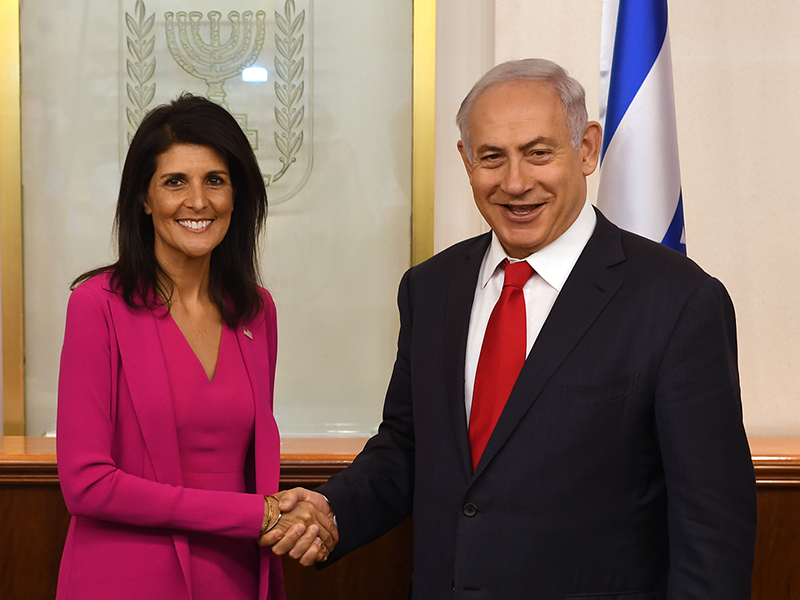On April 10, the Jewish Community Council of Montreal (JCCM), in collaboration with Federation CJA, will honour former United States ambassador to the United Nations Nikki Haley with their King David Award at a gala fundraising dinner in Montreal for her defence of human rights and solidarity with Israel and the Jewish people.
Yet historically, Haley has displayed questionable conduct on human rights affairs. For example, she threatened to withdraw U.S. foreign aid from countries that vote against U.S.-proposed policies at the UN. She also backed a campaign to suspend U.S. aid to Palestinians who displayed exasperation by the Trump administration’s recognition of Jerusalem as Israel’s capital. Additionally, during her time at the UN, she instigated the United States’ withdrawal from the Human Rights Council due to its anti-Israel bias, rather than using her leverage to improve the council, while also failing to acknowledge the good work it does globally.
Honouring an antagonist of social welfare is inconsistent with Jewish values of promoting community well-being. It also suggests that Haley’s approach to solidarity with Israel represents the sole and unified opinion of the Jewish community of Montreal. As a member of this community, seeing major Jewish institutions put forth this message fills me with shame. If CJA and the JCCM associate themselves with perpetrators of the occupation of Palestinian territories and upholders of human rights violations in the name of our people, then I have to wonder whether they truly have the Jewish community’s interests at heart.
READ: FORMER UN AMBASSADOR HALEY TO SPEAK AT MONTREAL GALA
Jewish institutional support for the State of Israel stems from a valid place: the Jewish people have a long history of persecution, facing xenophobia and anti-Semitism time and time again. The fear of alienation is still alive, especially in light of the Pittsburgh synagogue shooting last October. Many believe that the Jewish state is the beacon of our prosperity and provides us a haven of safety and acceptance. Israel serves as the home to many millions of Jewish immigrants and refugees escaping anti-Semitism in their own communities throughout the world. Many of my dear friends and family members were forced to flee from anti-Semitism in the Soviet Union, as well as escape eastern Europe during the Holocaust. For example, my great grandmother escaped from Latvia during the Second World War and started a family in South Africa; I now have family living in Israel as a direct result of this oppression. However, the way the Israeli government and military currently operate — through disproportionately violent reactions to Palestinian activism, limiting Palestinians’ mobility and democratic rights, and fostering hatred — is not the cure for anti-Semitism nor the path to Jewish prosperity. In fact, this conduct imposes a moral hazard by promoting anti-Semitism as people seek to hold Jews collectively responsible for such actions.
These institutions’ contentious messaging through their affiliation with polarizing organizations and individuals has forced me to politicize my religious beliefs through activism against the occupation, for I cannot endlessly justify actions I feel are inconsistent with Jewish humanitarian values. To ensure the longterm success of our people as well as freedom and dignity for all Israelis and Palestinians, and for ourselves, we must face criticism, listen to the pleas of affliction, and respond accordingly.
Some of my friends and family reading this may interpret my statement as a betrayal of the Jewish community, make assumptions about my views on Zionism, or even dismiss me as anti-Semitic. The fact is that Judaism is an integral part of my life, identity and self-conduct. I grew up in a Jewish household, attended Jewish day school and currently work at a synagogue. Opposing the Israeli occupation of the Palestinian territories does not negate the validity of how the State serves the Jewish people. The issues I discuss are not exclusive to certain religious values or political ideologies, nor must one have a stance on Zionism, BDS, or address the question of statehood to involve themselves in the discussion.
I am demanding simply that my community recognize the Occupation is an injustice. Many of my fellow community members who do not share my opinion and shy away from this discourse recognize that there is a moral conflict. No problem can be solved by voluntary ignorance or by immediately blacklisting criticism without fully comprehending the argument. We may be far from a solution and should not expect to find one immediately, but the first step toward progress, justice and peace is to understand why people are angered and engage in the public discourse.
The JCCM serves to safeguard Jewish rights and assist local residents in all areas of life in keeping with Jewish traditions. Federation CJA has a long history of representing our community’s interests, including lobbying against government restrictions on immigration throughout the 20th century, and cracking down on the rise of homegrown fascism during the 1930s. Today, the CJA continues to alleviate poverty, support children and those who are vulnerable, and provide crisis and intervention counselling. One of the founding pillars of Federation CJA is the Jewish value of Tikun Olam , which is the Jewish obligation to behave constructively and act beneficially, while recognizing that we bear responsibility for the welfare of our society and of ourselves.
Despite these institutions’ longstanding history of altruism, their decision to uphold two separate sets of principles toward the Montreal Jewish community and the Palestinian communities of the occupied territories, further entrenched by aligning our community with Haley, jeopardizes their relationship with many Jewish people who share my beliefs. If Jewish institutions truly wish to uphold the principle of Tikun Olam, they must continue to emphasize the needs of our local community, and focus on what unites, rather than what divides us.
